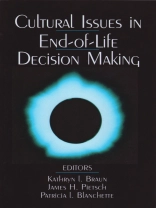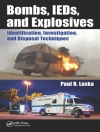‘ Cultural Issues in End-of-Life Decision Making creates an engrossing tension as chapters on philosophical topics are interwoven with clinically-oriented ones including case examples that ground the reader in the reality of most human decisions. I highly recommend this book to researchers, health care providers, clergy, and other practitioners dealing with end-of-life issues.’ —Catherine Hagan Hennessy, Health Care and Aging Studies Branch, Center for Disease Control and Prevention
End-of-life decision making is one of the most difficult but crucial challenges faced by patients and their families. In most cases, resources or counselors providing guidance in these decisions are not available. This book is intended to prepare nurses, physicians, and other health care workers to fill this role, insofar as they are most frequently in contact with the patient and his/her family and significant others at the time choices must be made. In this informative, practical book, Braun, Pietsch, and Blanchette first review the medical, legal, and ethical context of the dying experience, discussing ethnic perspectives and religious issues. For example, providing cultural and spiritually sensitive care requires that nurses, physicians, social work and others know and understand the implications of family members beliefs about life and death, supportive rituals and other activities. This book does a creditable job of presenting the issues and a broad overview of culture and common religions in America.
About the Editors:
Kathryn L. Braun, Dr.P.H., is Director of the University of Hawaii Center on Aging and an Associate Professor at the University of Hawaii School of Public Health. She is a Fellow in the Gerontological Society of American and the Association for Gerontology in Higher Education. James H. Pietsch, J.D., is Director of the University of Hawaii Elder Law Program (UHELP), an Associate Professor at the William S. Richardson School of Law, and a Clinical Adjunct Professor at the John A. Burns School of Medicine. In 1990, he was the recipient of the Fifth Annual Paul Lichterman Memorial Award for contributions to the advancement of Law and Aging.
Patricia L. Blanchette, M.D., M.P.H., is a Professor of Medicine and Public Health at the John A. Burns School of Medicine and School of Public Health at the University of Hawaii at Manoa. Dr. Blanchette is the Director of the Medical School′s cross-departmental Geriatric Medicine Program, and Geriatric Medicine Fellowship Program, the Pacific Islands Geriatric Education Center of Excellence in Geriatric Medicine. Dr. Blanchette has won numerous awards and honors, including an Excellence in Teaching Award, Distinguished Alumni, Best Doctors in America, and the Soroptimist′s Women of Distinction Award.
قائمة المحتويات
Preface – J. Lynn
Acknowledgments
1. An Introduction to Culture and Its Influence on End-of-Life Decision-Making – K.L. Braun, J.H. Pietsch, & P.L. Blanchette
PART ONE: THE MEDICAL, LEGAL AND ETHICAL CONTEXT OF DEATH AND DYING
2. Physical Aspects of Dying – J.A. Patterson Fago
3. Cognitive Changes That Affect Capacity and End-of-Life Decisions – R.A. Martino
4. Autonomy, Advance Directives, and the Patient Self-Determination Act – J.H. Pietsch & K.L. Braun
5. Ethical Considerations and Court Involvement in End-of-Life Decision-Making – M.B. Kapp
PART TWO: ETHNIC PERSPECTIVES AND END-OF-LIFE DECISION-MAKING
6. Cultural and Religious Issues for African Americans – C.P. Mouton
7. Advance Directives and End-of-Life Care: The Hispanic Perspective – M.A. Talamantes, C.Gomez, & K.L. Braun
8. Cultural Issues in End-of-Life Decision Making among Asian and Pacific Islanders in the United States – G.Yeo & H. Nikoyeda
9. End-of-Life Decision Making in American Indian and Alaska Native Cultures – N.W. Van Winkle
PART THREE: RELIGIOUS PERSPECTIVES ON END-OF-LIFE DECISION MAKING
10. Christian Perspectives on End-of-Life Decision Making: Faith in a Communtiy – M. Rowell
11. Catholic Perspectives on Euthanasia and Assisted Suicide: The Human Person and the Quest for Meaning – M.R. Alexander
12. Jewish Perspectives on End-of-Life Decision Making – W. Kavesh
13. Muslim Perspectives Regarding Death, Dying, and End-of-Life Decision Making – H.A. Hai & A. Husain
14. Buddhist Issues in End-of-Life Decision Making – R.Y. Nakasone
PART FOUR: END-OF-LIFE ISSUES IN INSTITUTIONAL CULTURES AND FOR SPECIAL POPULATIONS
15. Issues in End-of-Life Decision Making in the Hospital and Nursing Home Culture – C.A. Pierson
16. End-of-Life Issues in the Military Culture – P.W. Nishimoto & R.E. Newman
17. End-of-Life Issues in the HIV/AIDS Community – R. Ogden
18. End-of-Life Issues: A Disabilitites Perspective – T. Koch
19. Talking to Patients About Death and Dying: Improving Communication Across Cultures – S.L. Kogan, P.L. Blanchette, & K. Masaki
Author Index
Subject Index
عن المؤلف
James H. Pietsch joined the law school after first having served on active duty in the US Army Medical Service Corps and the Judge Advocate General’s Corps and subsequently serving as the directing attorney of the Honolulu Elder Law Unit of the Legal Aid Society of Hawai′i. At the law school he teaches Law, Aging and Medicine, Elder Law Clinic, Advanced Elder Law Clinic, and Health Law: Bioethics. He also holds a joint appointment at the John A. Burns School of Medicine where he specializes in issues at the intersection of law, aging, medicine, bioethics and psychiatry.
Professor Pietsch serves as the law school Pro Bono faculty advisor, and supervises the University of Hawai′i Elder Law Program (UHELP). UHELP provides year-round direct legal services at the law school to socially and economically needy older persons. Professor Pietsch is a recipient of the Paul Lichterman Award for outstanding achievement in the advancement of legal services for older persons.
In 2007 Professor Pietsch volunteered to serve as a Special Advisor to the Law and Order Task Force of the Multi-National Force-Iraq and subsequently served as a Rule of Law Advisor to the U.S. Embassy Baghdad Provincial Reconstruction Team and Kurdistan Regional Reconstruction Team in Iraq. More recently he served as a consultant for a US Pacific Command Rule of Law project in Timor Leste and a USAID-sponsored Access to Justice project back in Iraq. His Rule of Law work continues in Hawai′i as the faculty adviser to the law school’s Hammurabi Legal Forum.












